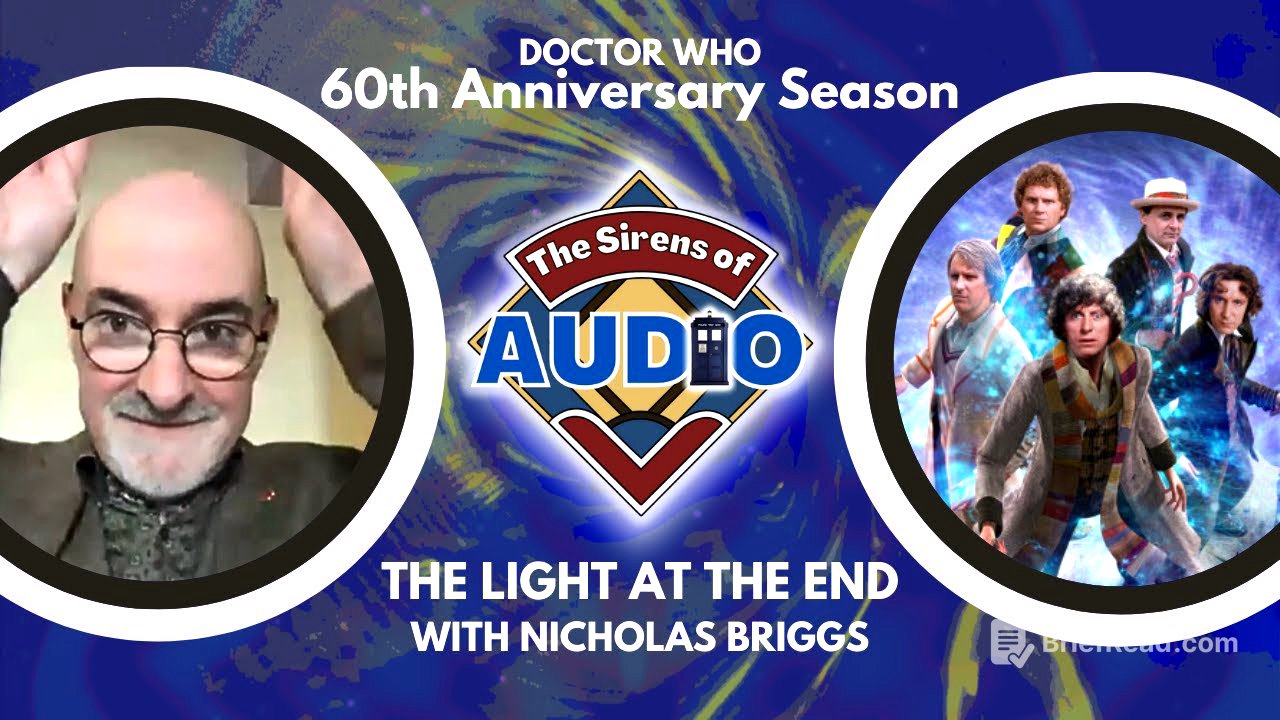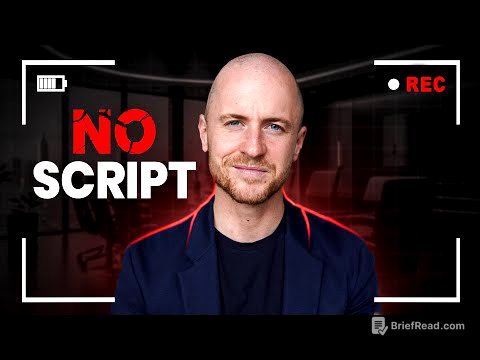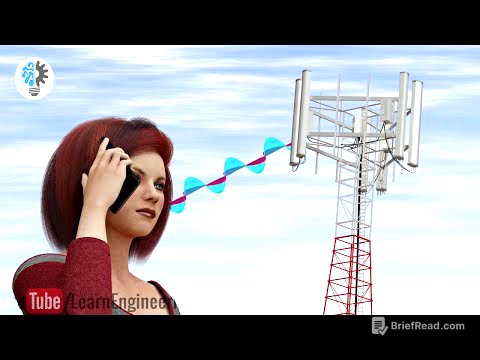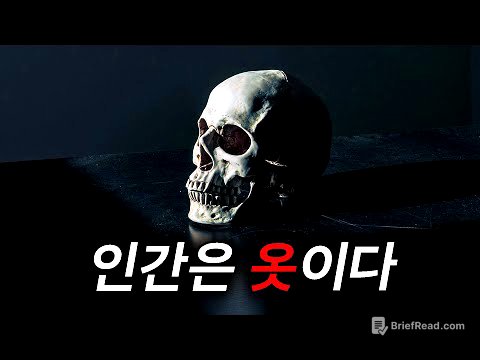TLDR;
This episode of The Sirens of Audio celebrates the 60th anniversary of Doctor Who by featuring Nicholas Briggs, a key figure in Doctor Who audio productions. The discussion covers a range of topics, from personal "comfort episodes" to an in-depth look at the 50th-anniversary audio drama "The Light at the End."
- Personal comfort episodes and their nostalgic value.
- The creative process behind "The Light at the End" and the challenges of multi-Doctor stories.
- The evolution of Big Finish audio productions and future projects.
Intro [0:00]
The hosts introduce Nicholas Briggs, celebrating the 60th anniversary of Doctor Who and setting the stage to discuss Briggs' work on the 50th-anniversary audio drama, "The Light at the End."
Down the Rabbit Hole: Comfort Episodes [3:43]
The hosts and Nicholas Briggs discuss their personal "comfort episodes" of Doctor Who. Dwayne shares his fondness for "Doctor Who and the Silurians," highlighting its unique atmosphere and personal connection as one of the first episodes he recorded off the TV. Nick agrees, mentioning it's also in his top three. Philip chooses "The Robots of Death," praising its perfect blend of plotting, acting, and set design, and recalling the emotional impact it had on him as a child. Nick expresses jealousy over not having recorded "The Silurians" when he first saw it, detailing his early experiences with audio recordings of Doctor Who episodes and his obsession with "Death to the Daleks."
Favorite Doctor and Animations [10:15]
Nick reveals that while Patrick Troughton is his favorite Doctor, John Pertwee's era holds a special place for him, particularly when viewed in black and white, which he believes enhances the visual storytelling due to the directors' background in black and white television. He expresses a desire to see "Evil of the Daleks" again, reminiscing about the impact it had on him. The discussion shifts to the animated reconstructions of lost episodes, with Nick expressing reservations about them overwriting his original memories and noting the limitations of their budgets, which affect the quality and stylistic choices.
Rediscovering Lost Episodes [16:33]
Nick shares an emotional story about the recovery of lost episodes like "The Enemy of the World" and "The Web of Fear," recounting how he wept with joy upon their release on iTunes. He emphasizes how seeing "The Enemy of the World" elevated his appreciation for the story, which he had previously found dull. The conversation touches on the musical scores of classic Doctor Who, particularly Carrie Blyton's work, and Nick's own experiences composing music for Doctor Who audio dramas, including "Intelligence for War."
Challenges in Music Production [20:17]
Nick discusses the challenges of creating music in the style of Dudley Simpson for the Third Doctor stories and shares an anecdote about working with a younger producer who didn't immediately grasp the musical cues he was using. He mentions composing the score for "Intelligence for War" and his approach to capturing the era's musical style.
The Light at the End: Anniversary Story [25:52]
The discussion transitions to "The Light at the End," the 50th-anniversary audio drama. Nick admits to generally disliking celebrations due to the hype often exceeding expectations. He recounts how David Richardson and Tom Baker convinced him to create a multi-Doctor story, leading him to approach it in his own way. The planning for the story began over a year in advance, with John Dorney providing a framework. Nick wrote the main story, while David Richardson contributed specific scenes.
Crafting the Story and Characters [31:05]
Nick explains his approach to writing "The Light at the End," emphasizing his desire to avoid a crowded TARDIS and instead focus on individual adventures for each Doctor and companion pairing. He expresses pride in reaching a point in his career where he can draw on past experiences and insights from working on Doctor Who. He also mentions his interest in creating a new version of a multi-Doctor story featuring the recast versions of the First, Second, and Third Doctors, praising the actors who have taken on these roles.
Directing and Production Challenges [36:09]
Nick describes the logistical challenges of directing such a large cast, noting that scheduling and availability dictated the recording order. He praises producer David Richardson for his organizational skills. Despite the difficulties, Nick enjoyed working with the actors and discussing the scenes. He recalls the unique experience of having Tom Baker and Paul McGann in the studio together, despite their lack of interaction outside of recording.
Music and Legacy of "The Light at the End" [39:17]
Nick discusses the special theme tune created by Jamie Robertson for "The Light at the End," highlighting its emotional impact and incorporation of various Doctor Who era elements. He notes that Jamie had a clear vision for the music, requiring minimal input from him. The conversation shifts to the reception of "The Light at the End" and the possibility of future multi-Doctor stories. Nick emphasizes the importance of boiling down what embodies Doctor Who at a particular moment in history for anniversary celebrations.
Future Projects and the Changing World [45:33]
Nick shares his excitement for upcoming Big Finish projects, including "Fugitive of the Daleks" and new Second Doctor box sets. He also mentions plans for more First Doctor stories and a Third Doctor adventure with a modern sensibility. The discussion touches on the challenges of predicting the future and the importance of addressing root causes rather than surface-level issues.
Emotional Depth and Improvisation [47:50]
Nick discusses the emotional depth of recent Third Doctor stories, particularly those involving Jo Grant, and shares an anecdote about Katie Manning's improvisational performance in one such story. He emphasizes the importance of balancing emotional expression with restraint to create a more impactful experience for the audience.
Website Issues and Workload [54:29]
Nick addresses the Big Finish website's issues and his reduced involvement due to an overwhelming workload. He acknowledges the need to delegate responsibilities and expresses concern for colleagues who take on too much. He mentions his efforts to recruit new talent and promote diversity within Big Finish.
Family Involvement and Fond Memories [1:00:10]
Nick shares a fond memory of his son Ben's participation in "The Light at the End" and other Big Finish productions. He notes Ben's shyness and their approach to allowing him to develop his own personality without pressure.
Recommendations: Audacity and 11th Doctor Chronicles [1:05:29]
Philip recommends "Audacity," praising its light-hearted tone, Jay Griffith's performance as Audacity, and Benji Clifford's sound design. Dwayne also recommends "Audacity," highlighting the detailed sound design. Nick recommends the 11th Doctor Chronicles, particularly "All of Time and Space," praising Jake Dudman's portrayal of the Doctor and James Goss's writing.
Torchwood and Farewell [1:14:16]
Nick praises the creativity and organization of the Torchwood audio range under James Goss's leadership. The hosts thank Nicholas Briggs for joining them and wrap up the episode, celebrating the Doctor Who 60th anniversary.









